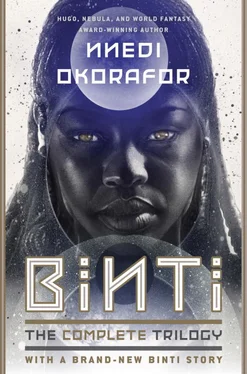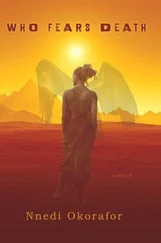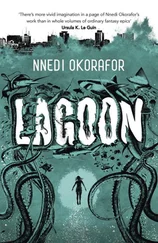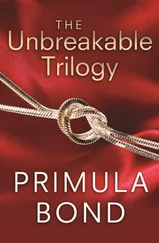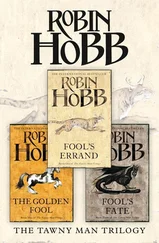My mouth fell open and I looked at my father, who did not look at me.
“How will I know?” my father asked.
She looked down her nose at him. “Such a proud son you are.”
My father finally looked at me. My mother grabbed my hand. “Not going anywhere,” she muttered. I was shocked by so much that I could only stare at her. “We just got her back!” my mother told my father.
“You people are so brilliant, but your world is too small,” the old woman who was my father’s mother, my grandmother, said. “One of you finally somehow grows beyond your cultural cage and you try to chop her stem. Fascinating.” She looked at my father. “Don’t you remember what happened with your father?” She straightened up. “Your daughter, my granddaughter, has seen the Night Masquerade.”
My sister Peraa, who was standing beside me now, gasped and looked at me. “You did?” she whispered.
I nodded at her, still unable to speak.
She grabbed my other hand. “Is that why you—”
“No, she hasn’t!” my mother snapped.
The old woman chuckled and her hands twitched and began to move again, zigzagging, punching, waving. The astrolabe around her neck bumped against her chest, not once touched by the woman. “Why do you think we came out here? There are rituals to be performed.”
Even from where I stood, I could see that her astrolabe was one that had been made by my father. The unique slightly oval shape, the rose-tinted sandstone, this was an astrolabe he’d made some time ago. My mother must have noticed this too, because she turned and gave him a dirty look.
The other Desert People standing close by all laughed, some of them making the strange hand motions. I looked back at Okwu and frowned. Several of my relatives had now gathered, none of whom wanted to stand near Okwu. It stood behind them all, but beside it stood one of the Desert People, a bushy-haired boy of about my age.
“We’ll take your daughter, our daughter, into the desert,” my grandmother said. She turned to Okwu. “Your daughter, too. She will speak with our clan priestess, the Ariya. We bring her back the night after this one.”
* * *
My mother wept and my father had to pry my hand from hers. Seeing her weep made me start to weep. Then Peraa started weeping. My brothers just stood there and I saw my sister Vera angrily walk away. More neighbors came out and there was self-righteous nodding and some mumbling about me bringing the outside to the inside. I heard a gravelly voiced friend of my mother’s loudly say, “She should have stayed there.”
Okwu said nothing. Nothing at all.
I was walking into thedesert with the Desert People.
I turned back to the Root, my legs still moving me up the sand dune. I could still see my brother’s garden, my bedroom window, and even the spot below where the Night Masquerade had stood. Then we were moving down the sand dune and I looked back until I couldn’t see the Root any longer. “What am I doing?” I whispered.
My grandmother was walking beside me, tall and lean as a tree. “Did you bring otjize in your satchel?” she asked.
“Yes,” I quietly said, patting my satchel.
She laughed loudly. “Of course you did.” She moved her hands in front of her face, a smile still on her face, and I frowned, watching her. She said nothing when we were walking up the second sand dune and I took out the jar and began to reapply it to my arms and face, the places my mother had held me and tears had run.
Contrary to what my family thought, I knew exactly who I was going to see and I needed to look my best when I saw her. I had been eight years old and terrified when I met the Ariya completely by chance. She was the first person to whom I’d shown my edan, even before my father. She hadn’t called it an edan, she’d called it a “god stone” and said I was lucky to have it. And now I was being brought to her with the thing in pieces.
* * *
There were dangerous creatures in the hinterland, and at night many didn’t sleep.
A lean boy about my age and height named Mwinyi was charged with protecting the group. He was the one whom I’d glimpsed standing beside Okwu. Unlike the others who had dark-brown hair like me, Mwinyi had a head of bushy red-brown hair and I couldn’t tell if the color was due to his hair being full of the desert’s red dust or if this was its natural color. And he had a thick matted braid growing in the middle that was so long it reached his knees. It swung about his back like a snake when he walked. I couldn’t understand how this boy was going to protect a group of nineteen adults until I saw what he could do.
Three hours after we’d scaled that first sand dune, the pack of wild dogs came. There were at least thirty and you could hear them coming from far away. They yipped and barked with the confidence of a pack that didn’t need stealth to catch food or stay safe. They spotted and came at us without hesitation. Only I was terrified. Everyone else simply stopped and sat down on the sand, including the two camels. My grandmother put her hand on my shoulder to keep me calm. “Shhh,” she said.
Mwinyi was the only one standing. Then he walked right to the dog pack, his hands moving in the Desert People way. Not slowly. Not quickly. In the soft moonlight, the sight was mystical, like watching something right out of the stories my father liked to tell during the Moon Fest. I couldn’t hear him clearly, but I heard him speaking the language of the Desert People. He laughed as the dogs crowded him, sniffing and circling. Then Mwinyi said something and every single one of them stopped moving. And they were looking at him, at his face, as he spoke softly to them.
Then, just as suddenly, every single dog looked at us . I gasped and pressed my hands to my gaping mouth. I softly spoke a few choice equations and dropped a degree into meditation, just enough to stop shaking. I wanted to see this with all my senses and emotions sharp. Mwinyi was speaking to the dogs who would have harmed us. Several of the dogs near the back yipped agreeably, took one more look at us, and then went on their way. The others followed after a moment.
“He’s a harmonizer?” I asked.
My grandmother looked at me. “We don’t call them that.”
“Then what do you call him?”
“Our son,” she said, standing up. Mwinyi waved at us and we continued on our way. As we walked, I reached my hand into my pocket and touched the pouch full of my dissembled edan . Even in pieces, it was as much of a mystery to me now as it was when I’d found it…
Destiny Is a Delicate Dance
…nine years ago. I wasout there that morning because I’d grown profoundly angry and run away from home. No one knew that I was angry and no one realized I’d run away. What had upset me was so trivial to my parents and older siblings that they didn’t even realize I was upset. There was to be a dance at the Annual Wind Fest and though all of my age mates were participating, my parents and older siblings had decided it was best for me not to take part in it.
The Diviner had officially tapped me as the next family master harmonizer the week before and so much had already changed about how I was treated and what I was allowed and not allowed to do. Now this, all because I had to “sharpen my meditating skills and equation control” when I was already able to tree faster than my father.
Nevertheless, one does not argue with elders. Thus, I had accepted the restriction quietly as I had accepted being tapped as the next master harmonizer, despite the fact that I could never own the shop because I was a female. Shop ownership was my brother’s honor. For our family to prove that it could produce a next generation of harmony brought fortune and great respect to us, so I was proud.
Читать дальше
